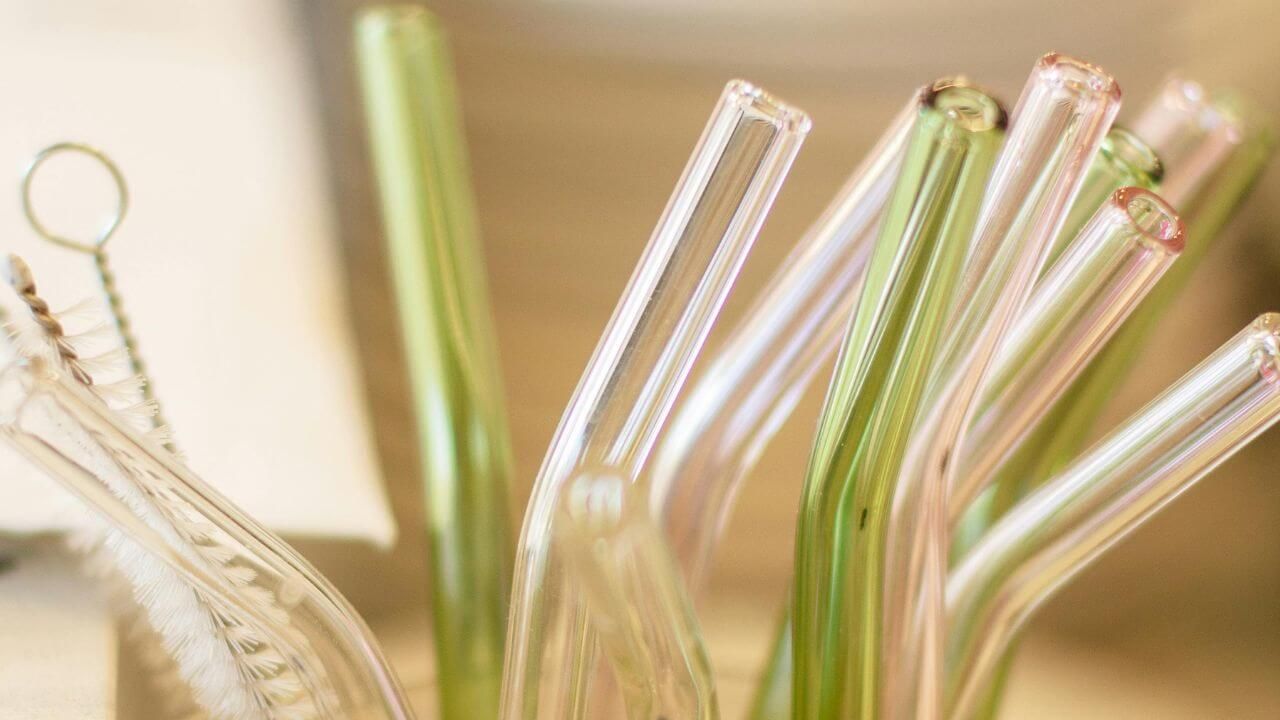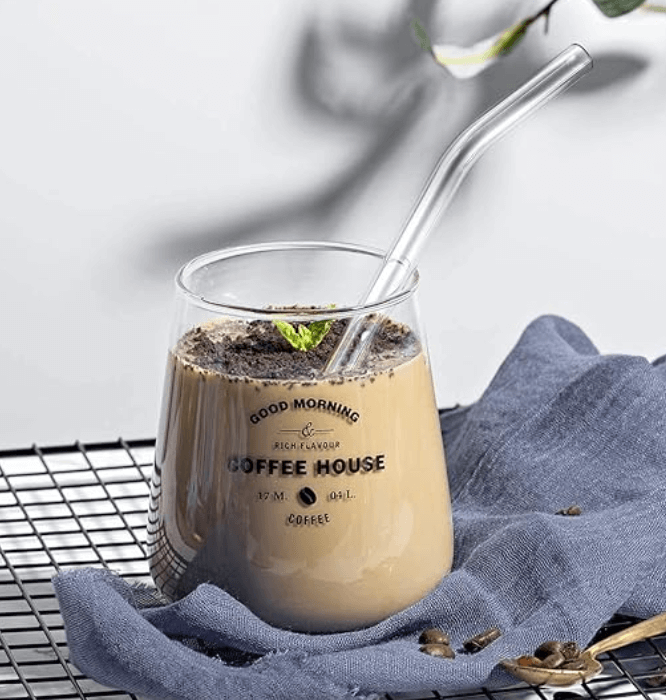
Ditch Plastic Straws: The Best Nontoxic Alternatives for Your Health
Mar 27, 2025Plastic Straws Are Toxic: Here's What to Use Instead
Plastic straws are everywhere—convenient, disposable, and seemingly harmless. But beneath their everyday benefit lies a toxic truth: they leach harmful chemicals into your drinks and contribute to environmental devastation.
Moreover, it is known, micro/nanoparticles may be directly inhaled and released from the drinking straw as compared with other plastic products, posing human health risks. It is expected that a large number of plastic particles may be leached out from the plastic straw depending on the liquid type and the plastic straw quality. The acidic liquids (such as Coca-cola, and Pepsi), and Alcohols may highly fragment the plastic straws and be directly ingested by the users. Consequently, reducing the use of plastic straws (such as for juice, soft drink, and alcohol drinking), understanding their quality and effect, and the severe risks to human health is critical.
Source: Aragaw TA. Sustainable management of drinking plastic straws is required to reduce plastic pollution: Are we using them more during COVID-19? J Hazard Mater Adv. 2023 Nov;12:100328. doi: 10.1016/j.hazadv.2023.100328. Epub 2023 Jun 2. PMID: 37324518; PMCID: PMC10234838.
The good news? Safer, nontoxic alternatives exist. Here’s why you should avoid plastic straws and the best options for a healthier, more sustainable lifestyle.
The Hidden Dangers of Plastic Straws
1. Plastic Straws Can Leach Harmful Chemicals into Your Beverage
Most plastic straws are made from polypropylene, a petroleum-based plastic. When exposed to heat or acidity—like in coffee, tea, or citrus juices—they can release harmful chemicals.
- Endocrine Disruptors: Studies show that chemicals like bisphenol A (BPA) and phthalates can leach from plastics into food and beverages, interfering with hormone function and potentially contributing to infertility, obesity, and developmental disorders in children (PubMed, 2023).
- Microplastics in Your Body: Over time, plastic straws degrade into microplastics, which can enter your system through ingestion, potentially causing inflammation and oxidative stress. (Environment International 2022) Microplastics have been found in human blood, placentas, and even breast milk. A 2022 study published in the journal Environment International detected microplastics in almost 80% of people tested. Plastic straws contribute to this problem.
2. The Environmental Toll of Plastic Straws
Plastic straws are among the top contributors to ocean pollution. According to the 2023 PubMed study, microplastics from consumer products—including straws—contaminate marine life, disrupt ecosystems, and even enter the human food chain.
- Non-Biodegradable Waste: Plastic straws take up to 200 years to degrade, lingering in landfills and oceans long after their brief use.
- Wildlife Harm: Sea turtles, fish, and birds mistake plastic straws for food, leading to injury, suffocation, or starvation.
The Best Nontoxic Straws for a Safer Sip
If you’re ready to ditch plastic straws, these nontoxic alternatives offer both health and environmental benefits.
1. Glass Straws: Elegant and Non-Toxic
Glass straws, typically made from durable borosilicate glass, are a safe, chemical-free choice.
✅ Pros:
- Nonporous and free from toxins
- Easy to clean and dishwasher-safe
- Aesthetic and stylish
❌ Cons:
- Can break if dropped
- Not ideal for kids
🔹 Best Pick: Glass Straws—handmade, durable, and beautifully designed.

2. Stainless Steel Straws: Durable and Travel-Friendly
Stainless steel straws are a long-lasting, nontoxic option.
✅ Pros:
- Unbreakable and rust-resistant
- Chemical-free
- Ideal for travel and on-the-go use
❌ Cons:
- Conducts heat (not ideal for hot beverages)
- Can feel metallic when sipping
- Can't see if the insides are truly clean
🔹 Best Pick: Stainless Steel Straws—safe, durable, and comes with a silicone tip for comfort.

3. Plant-Based Straws: A Biodegradable Alternative
Disposable straws can be made from plants like bamboo or agave, making them easier to decompose naturally.
✅ Pros:
- 100% biodegradable and compostable
- Lightweight and travel-friendly
- Sustainable and plastic-free
- Disposable
❌ Cons:
- Can absorb flavors
- May soften with liquid
🔹 Best Pick: Agave Straws—organic, handmade, and fully compostable.

Final Thoughts: A Small Change with a Big Impact
Ditching plastic straws is a simple yet powerful way to reduce your toxic exposure and environmental footprint. With healthier alternatives like glass, stainless steel, silicone, and bamboo, you can enjoy your favorite drinks without harming your body or the planet.
Ready to make the switch? Choose a nontoxic straw that fits your lifestyle and sip sustainably today.
Podcast Show Notes
🎙 Introduction
Welcome to Practical Nontoxic Living! I’m Sophia Ruan Gushée, and today we’re tackling a seemingly small but surprisingly toxic everyday item—plastic straws.
You might think, "It's just a straw, how bad could it be?"
But what if I told you that plastic straws can leach hormone-disrupting chemicals into your drink, expose you to microplastics, and contribute to infertility, obesity, and even cancer? And let’s not forget their devastating impact on our oceans, wildlife, and environment. But don’t worry—I won’t leave you without solutions.
Today, I’ll share the best nontoxic straws that are safe for your health and the planet. So grab your favorite drink (hopefully with a nontoxic straw), and let’s dive in!
The Toxic Truth About Plastic Straws
Let’s start with the big question: Why should we avoid plastic straws? Most plastic straws are made from polypropylene, a petroleum-based plastic. According to a 2024 article in the journal JAMA Network Open, polypropylene is also the most common type of plastic found in human brains. Polypropylene has been found in other parts of humans like the lungs.
Studies have found that when some plastics come into contact with hot, acidic, or alcoholic beverages, they can leach harmful chemicals like:
✅ Bisphenol A (BPA), which disrupts hormones and has been linked to infertility, obesity, and cancer.
✅ Phthalates, which interfere with reproductive health and child development.
✅ Microplastics, which break down over time and have been found in human blood, placentas, and even breast milk.
And here’s something wild—a 2022 study published in the journal Environment International detected microplastics in almost 80% of people tested. Yes, that means they are inside of us! And plastic straws contribute to this problem.
The Environmental Disaster of Plastic Straws
Beyond the health risks, let’s talk about what happens to plastic straws after we toss them.
Did you know that Americans alone use up to 500 million plastic straws every single day, according to the National Park Srvice? That’s enough to circle the Earth twice! The problem?
Plastic straws don’t biodegrade. It's estimated that plastic straws take 200 years to biodegrade. During their lifetime, they break down into smaller and smaller pieces, turning into microplastics that pollute our oceans.
A 2023 PubMed study confirms that marine life, from fish to sea turtles, mistake plastic for food, leading to injury and death. And guess what? If you eat seafood, you could be consuming those very same microplastics. So plastic straws don’t just disappear—they come back to haunt us in our food chain.
The Best Nontoxic Straws for a Healthier Sip
Alright, now that we know why plastic straws are a no-go, let’s talk about the best nontoxic alternatives.
🔹 Glass Straws – Stylish, toxin-free, and easy to clean. These are perfect for home use.
🔹 Stainless Steel Straws – Durable and travel-friendly, but they conduct heat.
🔹 Plant-based Straws – A compostable, plastic-free option.
Easy Ways to Make the Switch
Host: Now that you know the dangers of plastic straws and the best alternatives, how can you make the switch simple?
✔️ Keep a set of reusable straws in your bag or car so you always have one on hand.
✔️ Ask for “no straw” when ordering drinks at restaurants.
✔️ Introduce your family to nontoxic straws—kids love picking out their own fun silicone or glass straws!
Closing Thoughts
Host: Ditching plastic straws is a small but powerful way to protect your health and reduce plastic waste. If you found this episode helpful, rate it, share it with a friend, leave a review, and subscribe for more tips on living a practical nontoxic life.
And if you’re ready to make the switch, check out my list of recommended nontoxic straws above!
Until next time, stay safe, stay healthy, and keep making mindful choices!



